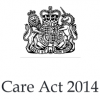
The Care Act 2014 – Key Points for Savers
May 26th, 2015
The rest of the UK?
Social care in Wales, Northern Ireland and Scotland is a devolved matter and therefore in general, Part 1 of the Act, which sets out the legal framework for the provision of adult social care, applies to local authorities in England onlyA two stage process applies.
On 1 April 2015, most of the Act came into force, including the means by which local authorities should carry out assessments and determine eligibility for support. In April 2016 the remaining parts of the Act will come into effect, including the introduction of the ‘care cap’.Treatment of capital
In some circumstances a person may be treated as possessing a capital asset even where they do not actually possess it. This is called notional capital and includes capital the person has deprived themselves of in order to reduce the amount of charge they have to pay for their care. Certain capital assets must be disregarded. These disregards include the surrender value of any life insurance policy. The treatment of investment bonds is described in the guidance as “complex.” Accordingly the guidance suggests that a local authority may wish to seek advice from its legal department. The guidance does however state the following:“Where an investment bond includes one or more element of life insurance policies that contain cashing-in rights by way of options for total or partial surrender, then the value of those rights must be disregarded as a capital asset in the financial assessment.”
Deliberate deprivation of assets
If a local authority decides that this has occurred in order to avoid or reduce a charge for care and support, then it may treat that person as owning the asset for the purposes of the financial assessment and charge accordingly. The guidance makes it clear that deprivation should not be automatically assumed. There may be valid reasons why someone no longer has an asset and a local authority should ensure it fully explores this first. Deliberate deprivation occurs where the individual has intentionally deprived or decreased overall assets in order to reduce the amount being charged for care. This therefore requires the individual to have known they needed care and support. A local authority should consider the following before deciding whether deliberate deprivation has occurred:- Whether avoiding the care and support charge was a significant motivation
- At the point the capital was disposed of could the person have a reasonable expectation of the need for care and support?
- Did the person have a reasonable expectation of needing to contribute to the cost of their eligible care needs?


